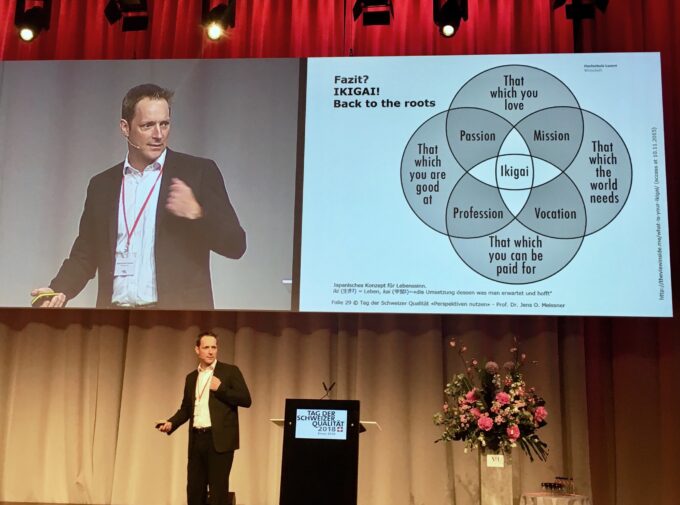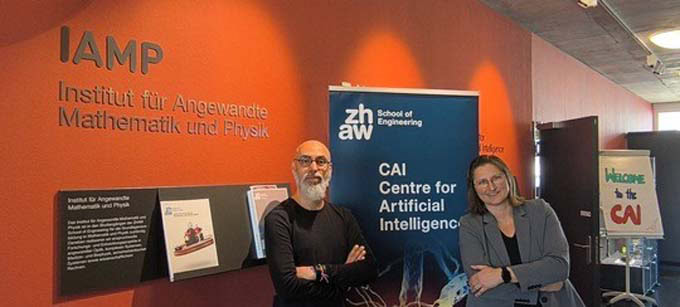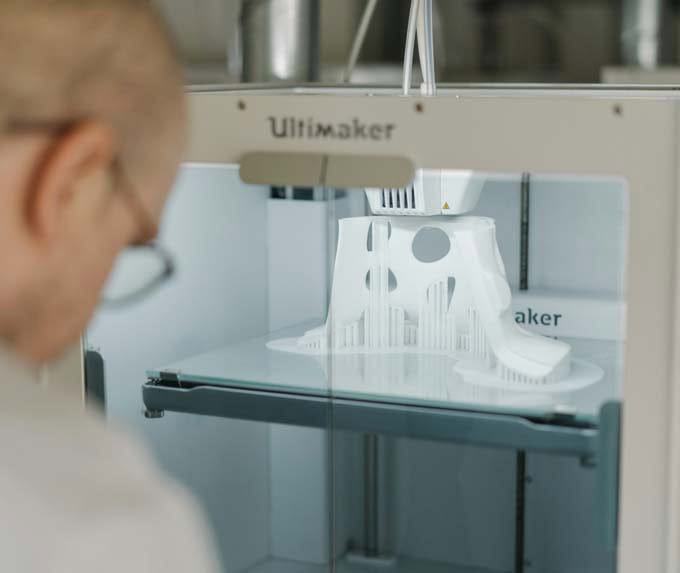Swiss Quality Day 2018 on perspectives for the future
This year's "Swiss Quality Day" was all about future prospects. On 30 May 2018, around 380 interested parties were able to take a look at modern work organisations and examine work processes. The congress organised by the SAQ and the SQS in the Kursaal Bern once again provided a number of highlights.

How, they asked themselves on Swiss Quality Day 2018, could they keep up with the times and optimise work processes? "Everything is changing. Processes need to be adapted - certainly perspectives are needed: Considerations from an existing point of view", Peter Bieri, Managing Director of the Swiss Association for Quality (SAQ), opened this year's Swiss Quality Day in front of around 380 motivated quality managers.
What life and in particular the working world will look like tomorrow, what effects, for example, digitalisation will have on leaders, where quality development and quality management will go in the future, and above all: how perspectives could be developed and used? These questions were discussed with great commitment.
New forms of work
"Actually," said Prof. Dr. Jens O. Meissner, "organizations have always been subject to change, see virtual processes and innovations in the 1980s," introduced the Professor of Organization and Innovation, co-director of the Master's program in Risk Management at the Lucerne University of Applied Sciences and Arts HSLU in developments of the Creativity and resilience research.
In itself, digitalization is nothing new in process development. However, technological developments, such as 24/7 presence times and advancing processes, have transformed the world of work in recent years to such an extent that new expectations and risks have emerged.
To respond to these changing circumstances, web-based companies such as Amazon, Uber or Spotify no longer rely on typical work hierarchies, but on so-called holocracies (see also Management & Quality 2018/05):
"Our society," says Jens Meissner, "is experiencing transparency and participatory involvement opportunities demanded through all levels. "Likewise, says the resilience researcher, in larger networks and companies, there are not only more favorable work structures, but also precisely siloed perceptions and "risks that are increasingly quickly encapsulated."
Man or machine?
What impact do such trends and changing role models have on people? Prof. Dr. Toni Wäfler from the FHNW University of Applied Sciences Northwestern Switzerland introduced "Human-Technology Interaction in the Digitalized World of Work" in a concrete way in the second conference presentation. It spoke of both specialization through new technologies and the dissolution of organizational boundaries.
The professor supports the fact that adaptive systems (keyword artificial intelligence) offer immense opportunities in monotonous processes or in highly critical areas. The "human being remains a bearer of experience" as long as he makes decisions, takes responsibility and shows commitment, according to some of the reasons given by the FHNW lecturer.
Ultimately, it was important not to deal passively with digital change processes. Toni Wäfler said that people, or rather employees, could certainly use perspectives and potential if they "not only complement" the machine, but could justify their actions and negotiate with other people.
The meeting place for quality managers
Quality has led the Swiss economy to success. In times of change, it is more important than ever before. Those responsible for quality are therefore even more challenged. The Swiss Quality Day is an important forum for supporting people on their professional journey. Beat Häfliger led deep into the world of SQS auditors and SME representatives with a practice-oriented "future workshop".
Beat Häfliger, the Managing Director of SAQ-Qualicon AG, took the conference guests on an expedition where QM managers reported on their professional roles "yesterday - today - tomorrow".
Representatives of SMEs and companies shed light on their personal challenges, turning points and concrete implementations of management models. Ulrike Sollmann, Head of Quality Management, gave an introduction to Corporate and Compliance Management at Hirslanden AG. Michael Baumgartner, Head of Quality, reported on the globally aligned, modular Warehouse & Distribution Solutions of Swisslog AG. Marco Schöpf, Head of Quality Management, PostMail, reported that each and every employee of Post CH AG was trained to improve processes - using the Kaizen method originating in Japan.
During the "Future Workshop", the conference participants were also able to contribute their experiences and views in a quality barometer via mobile phone.
Top performance
The development through digitalization and globalization constantly opens up new perspectives, but also individual development perspectives that were hardly imaginable just a few years ago.
The Swiss Quality Day provided a balanced spectrum of insights into the opportunities and dangers of digitalisation.
Symbolic values were also the subject of the lecture "Change through design - new banknotes for Switzerland", in which graphic designer Manuela Pfrunder spoke about her more than 13 years of work for the Swiss central bank and about her meticulous redesign of the 10th series of banknotes (see forthcoming issue Management & Quality 2018/06).
Other conference speakers such as Frederike Asael, Co-Founder Community Host of the Impact Hub, Bern, and certainly Chrigel Maurer, the multiple world champion in paragliding, also showed a lot of courage and will. Finally, the "Swiss Quality Day" showed once again that top performances of any kind usually require a lot of expertise and preparation time, and all the more patience and commitment.









